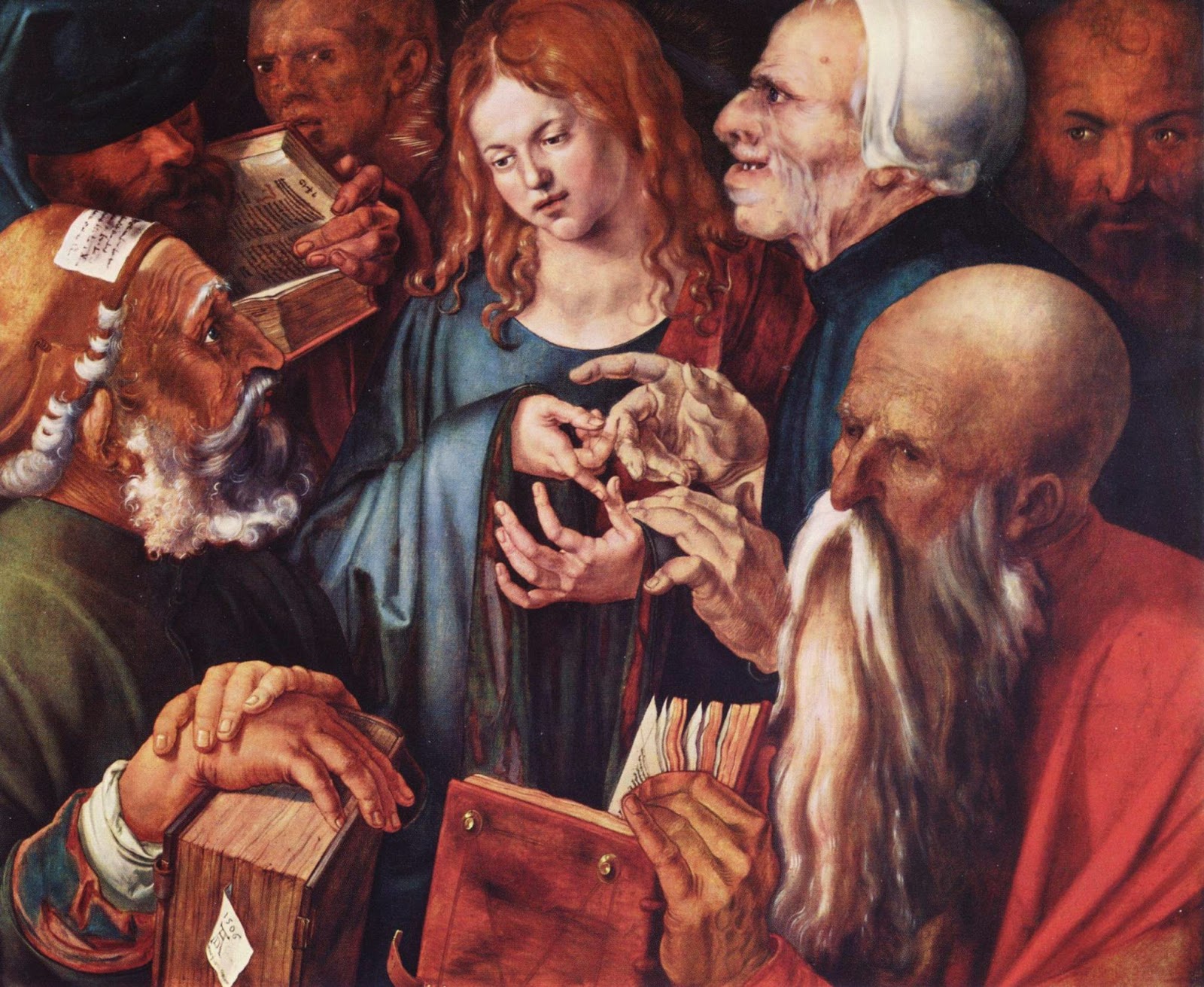2nd Epiphany
Luke 2:41-52Every year his [Jesus'] parents went to Jerusalem for the feast of the Passover. And when he was twelve years old, they took him with them. Now, after they had gone there and fulfilled the custom during the days of the feast, they set off on their way home. But the boy Jesus remained behind in Jerusalem. His parents did not know this; they thought he was among the company of the travelers. After a day's journey, they missed him among their friends and relations. When they did not find him, they returned to Jerusalem to look for him.
 |
| Durer |
After three days, they found him in the Temple, sitting in the midst of the
teachers, listening to them and asking them questions. And those who heard him were amazed at his mature understanding and his answers.
And when they saw him, they were taken aback, and his mother said to him, "My child, why have you done this to us? Behold, your father and I have been searching for you in great distress."
And he said to them, "Why did you look for me? Did you not know that I must be and live in that which is my Father's?"
But they did not understand the meaning of the words he spoke to them. And he went down with them again to Nazareth and followed them willingly in all things.
And his mother carefully kept all these things living in her heart. And Jesus progressed in wisdom, maturity, and grace [or, favor] in the sight of God and humans.
2nd Epiphany
January 17, 2021
Cynthia Hindes
You are likely familiar with the fairy tale in which what was raised as a duckling turns out to be a swan. In today’s gospel reading, the boy Jesus undergoes the first of his many transformations.
 |
| William Holman Hunt |
He comes into his own swan-hood: wise, mature, and beautiful. His parents don’t understand how unexpectedly he could turn into something so different from what they had known him to be.
There is a part of all of our souls that is like the boy. Our parents, our family, our society has laid certain expectations on us. But our true identity is swan-like. The boy Jesus is the archetype for how we deal with the possible conflict between the imperatives of our higher, our developing swan-nature, and the demands of our family and surroundings.
The young Jesus willingly follows both. And we too can firmly tread the path of our own higher development. And at the same time, we can respect and honor those to whom we are responsible.
Soon enough, the boy will leave home and embark on a world-shattering journey. But for now, despite a dawning self-awareness, he continues to develop quietly, inwardly. Perhaps he prays the words of Psalm 121:
I look deep into my heart,
to the core where wisdom arises.
 |
| Alexsandr Antonyuk |
Wisdom comes from the Unnamable
and unifies heaven and earth.
The Unnamable is always with [me] you,
shining from the depths of [my] your heart.
His peace will keep [me] you untroubled
even in the greatest pain.
When [I} you find him present within [me] you,
{I} you find truth at every moment.
He will guard [me] you from all wrongdoing;
he will guide [my] your feet on his path.
He will temper [my] your youth with patience;
he will crown [my] your old age with fulfillment.
And dying, [I] you will leave [my] your body
as effortlessly as a sigh.*
* Psalm 121, (adapted) from A Book of Psalms, trans. and adapted by Stephen Mitchell
and unifies heaven and earth.
The Unnamable is always with [me] you,
shining from the depths of [my] your heart.
His peace will keep [me] you untroubled
even in the greatest pain.
When [I} you find him present within [me] you,
{I} you find truth at every moment.
He will guard [me] you from all wrongdoing;
he will guide [my] your feet on his path.
He will temper [my] your youth with patience;
he will crown [my] your old age with fulfillment.
And dying, [I] you will leave [my] your body
as effortlessly as a sigh.*
* Psalm 121, (adapted) from A Book of Psalms, trans. and adapted by Stephen Mitchell







